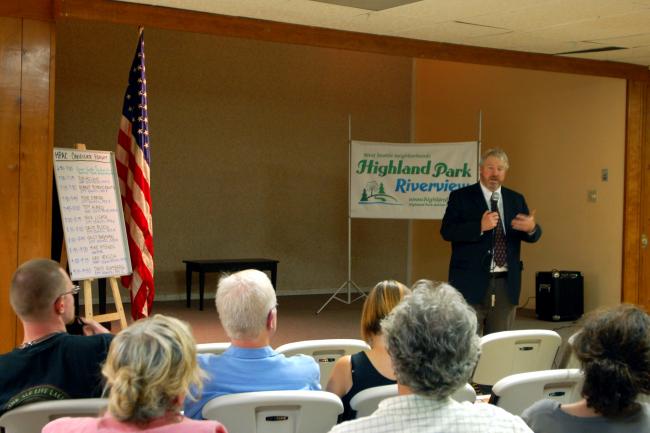Candidates spar over viaduct, economy, marijuana
Mayoral candidate Mike McGinn speaks to an audience at the Highland Park Improvement Club where citizens heard eight other city council or port commissioner candidates address issues, such as the future of the South Park Bridge, job creation, the Alaskan Way Viaduct, transit and the need to be green.
Thu, 09/24/2009
Candidates for Seattle City Council, Port of Seattle Commission and mayor discussed the future of the South Park Bridge, the proposed Alaskan Way tunnel, and even touched on legalizing marijuana, during a candidate forum hosted by the Highland Park Action Committee on Wednesday, Sept. 23.
The economy and the recession, however, were consistent themes.
“It’s economic opportunity,” said Tom Albro, a candidate for port commissioner. “It’s jobs, jobs, jobs.”
Albro’s talk on job creation touched on a broader populist note that candidates repeatedly turned to: listening to the people, creating jobs, working for the environment and lowering housing costs.
Improving (and approving of) transit options like buses, vanpools and bicycles were popular among the candidates. Seattle City Council candidate Mike O’Brien—who had perhaps heard that mayoral candidate Joe Mallahan lost his endorsement from the 42rd District Democrats partially because he’d chosen to drive his car six blocks rather than use a bicycle—began his speech by apologizing for his disheveled appearance because he had biked to the venue from Fremont.
The candidates repeatedly referenced this budget-cut year and sought to convince voters that they might either do more with less or they offered money-saving reforms. Some also attempted to build their working class credentials.
“I remember watching my mom trying to balance the checkbook and coming up with too much month at the end of the money,” said Robert Rosencrantz, O’Brien’s opponent for Richard McIver’s council seat.
Candidates offered definite answers to their support for replacing the Alaskan Way Viaduct with an underground tunnel. McGinn, transitioned to talking about the tunnel by acknowledging how much the issue defines his candidacy.
“You probably know me as that guy against the tunnel,” he said.
David Bloom, one of the contenders for Jan Drago’s council seat, also announced his opposition to the tunnel on the grounds that the $930 million the city is expected to contribute to the project could be re-invested in other infrastructure improvements. His opponent, Sally Bagshaw, said she would support the tunnel because she sees the tunnel as a long-term investment opportunity benefitting the city during the future.
But it was marijuana, not the tunnel, that drew the most applause from the crowd for Bagshaw. Bagshaw, who worked for the King County Prosecuting Attorney’s Office, said she supports decriminalizing the drug, calling the current law “absolutely crazy.”
Candidates also spoke of the need to provide affordable housing for working class families trying to live within the city.
An audience member representing the Seattle Housing and Resource Effort, a homeless advocacy charity, challenged mayoral candidate Mike McGinn to address homelessness if elected, citing his group‘s planned lobbying efforts to sleep outside the mayor’s house.
McGinn responded with an answer in support of the so-called tent cities, which he said needed the community’s support.
The 15-minute per candidate format gave each speaker enough time to announce their basic platforms and a few minutes to illuminate on finer points when answering audience questions. Many in attendance repeatedly asked about the South Park Bridge, which is in need of repairs and is pending a $99 million federal grant. No candidate sidelined the project when asked, repeating that it’s an important project.
Nine candidates in total appeared to speak, meaning the meeting lasted two hours and 15 minutes. (Council member Nick Licata did not appear for his allotted speaking time.)
“Democracy is not easy and you just proved it by sitting on these hard, plastic chairs,” said Rory Denovan, Highland Park Action Committee’s chair, to the group of approximately 30 community members who had sat through the whole meeting.
The meeting adjourned with candidates hobnobbing with citizens and at least one woman opting to make an exit with a “cookie for the road.”


